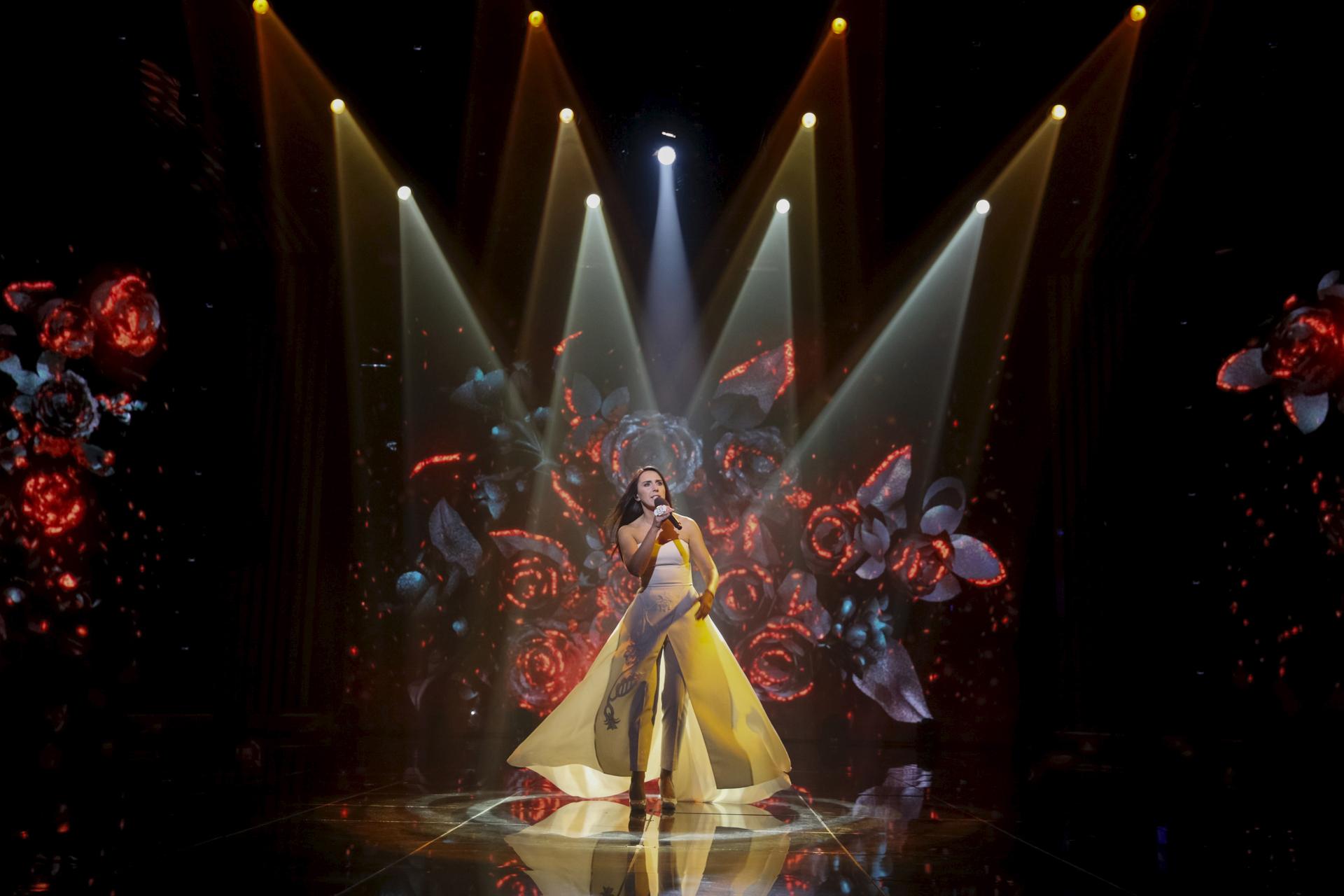Ukraine’s Eurovision 2016 entry is about Stalin’s repression, and Russia isn’t thrilled
Crimean Tatar singer Susana Jamaladinova, known as Jamala, performs during the Ukrainian national qualification for the Eurovision Song Contest outside Kiev, Ukraine, February 21, 2016.
A song about Soviet Moscow’s repression of the Crimean Tatar community is Ukraine’s entry for the Eurovision 2016 music contest. Though it concerns events more than 70 years ago under Josef Stalin’s regime, the online community seems to be discerning hints at Russia's more recent annexation of Crimea.
A 32–year-old Crimean Tatar singer, Susana Jamaladinova, who performs under the stage name Jamala, will represent Ukraine at Eurovision 2016, the annual European music contest.
Jamala’s song, “1944,” tells the story of her own great-grandmother. Like 240,000 other Crimean Tatars (the Turkic ethnic group that historically formed the main population of the Crimean peninsula), she was accused of being a Nazi collaborator, was thrown out of her home by Soviet soldiers, and was deported to Central Asia. Not everyone survived the trip in overcrowded trains without food, water or even fresh air. It was only 40 years later, around 1989, that they were allowed to return to their homeland.
oembed://https%3A//www.youtube.com/watch%3Fv%3DHtPHKrvlCVw
Is Crimea in 2016 like Crimea in 1944 for the Crimean Tatars?
“When strangers are coming,
they come to your house.
They kill you all and say
‘We’re not guilty’.”
This is how the song begins:
oembed://https%3A//www.youtube.com/watch%3Fv%3DJvlH33qJgn0
Although it doesn’t contain a single word about Russian president Vladimir Putin or Russia’s annexation of Crimea in 2014, Jamala has been quite open about where her sympathies lie.
In an interview with AFP before the national selection finale, she said she wanted people to hear a song written “in a state of helplessness” after Russia annexed Crimea, her home.
“It was hard for me to recall all these memories again and again, but I understand that it is necessary now,” she said. “Because now Crimean Tatars are desperate and they need support.”
Earlier, speaking to Radio Free Liberty, Jamala confessed that she is trying to attract international attention to what Russia is doing to Crimean Tatars. Without this publicity, she said, history might repeat itself.
“Now, Crimean Tatars are on occupied territory,” she said. “And it is very hard for them. They are under tremendous pressure. Some have disappeared without a trace, and that is terrifying.”
The Internet Users’ Verdict
Social media users in Ukraine as well as abroad who are following the story of Jamala and her performance in the national Eurovision finale seem to have no doubt that when she sings “1944,” what she really means is “2016.” Or that when she says “Stalin,” she really means “Putin.”
Russia also got the message. Shortly after Ukraine announced its entry for Eurovision 2016, Vadim Dengin, a Russian lawmaker and deputy head of the State Duma's committee on information policy, said he hoped the organizers of the European music competition would disqualify Jamala.
“A strange choice. I am sure that [Ukrainians] rigged the vote count, just to offend Russia one more time,” Dengin said in a comment to RIA Novosti news agency. The lawmaker also quipped that ordinary Ukrainians likely wouldn't care for Eurovision at all, because “they aren't being paid enough to afford electricity.”
Another State Duma deputy and deputy head of the culture committee, Elena Drapenko, noted that by choosing Jamala with her song “1944,” Ukrainians are trying to pull all possible strings to provoke Russia. “They are trying to find anything to pick on Russia, anything at all, even Crimean Tatars,” Drapenko said.
“1944” deemed too political?
Such a reaction from Moscow and a creeping anti-Jamala campaign among residents of Crimea pretty much guarantee zero points from Russia for Ukraine’s performance at Eurovision this year. On the other hand, if Jamala is allowed to perform “1944,” she might bring victory (or at least international attention) to Ukraine and the plight of Crimean Tatars. After all, there are quite a few countries in Eastern Europe and Central Asia that can relate to the experience of dealing with Soviet Russia back in the days to which Jamala refers in her song.
At the same time, it is still a big ‘if’ whether Jamala will be able to perform her song without any changes to the lyrics. As a general rule, Eurovision guidelines prohibit songs with lyrics that have political content.
A Eurovision spokesman told The Telegraph that all songs would be formally examined at a meeting on March 14, 2016. He declined to say whether it was likely that “1944” would be seen as overly political, but previous entries that have been deemed controversial have been banned or altered.
For example, in 2009, less than a year after Georgia and Russia engaged in a brief war, and Russia occupied two territories that previously belonged to Georgia, the competition barred Georgia’s proposed entrant from participating because the group’s song lampooned Russian President Vladimir Putin.
So far, Ukrainians at least seem to be pretty content with their choice of the song and the politics and history it represents.
Translation: "I just cried, jumped and squealed. Jamala is going to Eurovision! This is an example of a person who achieves their goal!!!"
Translation: "Jamala is going to Eurovision. Are you rooting for her?
13% no
73% yes
4% better than Serdyuchka (Ukraine's 2007 Eurovision entry)
10% there's something about her voice"
This year’s Eurovision music contest with competitors from around the continent (and beyond) will be held in Stockholm on 14 May, 2016. This story was originally published on Global Voices Online.
